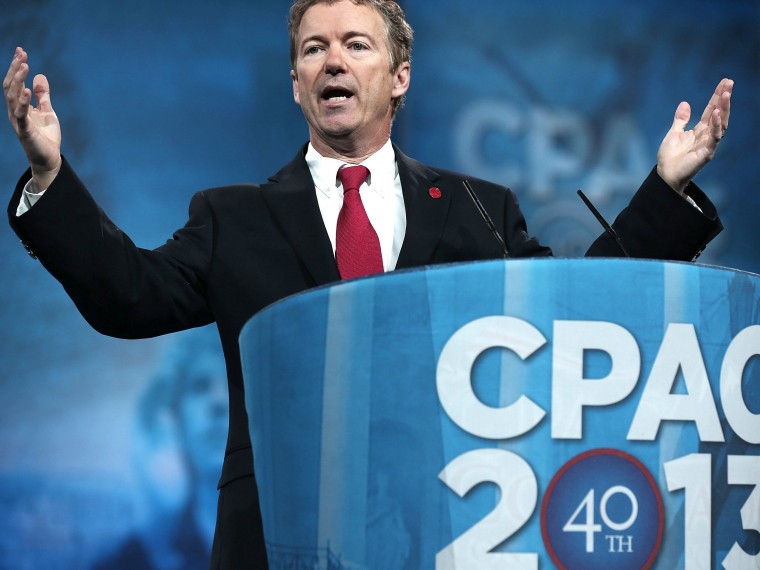Sen. Rand Paul, R-Ky., entered politics with more than just his father's name to his credit.
As an insurgent, Tea Party candidate for the U.S. Senate in 2010, Paul also benefited considerably from the movement that former Rep. Ron Paul built during his run for the Republican presidential nomination two years before. The elder Paul's campaign failed in 2008, as it did in 2012, but he succeeded in establishing himself as a kind of libertarian folk hero, especially for certain young voters who thrilled to his calls for ending government intrusion in all its forms, from the Corporation for Public Broadcasting to the War on Drugs.
Rand Paul followed the libertarian path blazed by his father all the way to the corridors of power on Capitol Hill. But now that he's made it to the Senate--and perhaps contemplating his own designs on the White House--Paul has to decide just how far his father's brand of libertarianism can take him.
Sen. Paul demonstrated the sincerity of his libertarian convictions recently, when he made an observation about the absurdity of U.S. drug laws:
Look, the last two presidents could conceivably have been put in jail for their drug use, and I really think, you know, look what would have happened, it would have ruined their lives. They got lucky, but a lot of poor kids, particularly in the inner city, don't get lucky. They don't have good attorneys, and they go to jail for these things and I think it's a big mistake.
Paul's comments, which came during an interview on Fox News Sunday, caused something of a stir. A close reading of them, however, shows that he is not willing to go as far as his father did in advocating for the repeal of laws that make the use or possession of drugs, such as marijuana, illegal. As he explained in the same interview, "the main thing I've said is not to legalize them, but not to incarcerate people for extended periods of time." To that end, Paul has teamed up with Sen. Pat Leahy, D-Vt., the liberal chair of the Senate Judiciary Committee, to introduce the Justice Safety Valve Act of 2013, which would give judges greater flexibility in sentencing federal crimes where a mandatory minimum punishment might be considered too harsh.
This is exactly the kind of "libertarian Republican approach" that Paul has said will bring more young people back into the GOP fold.
But for fans of the more free-wheeling libertarianism of his father, it might seem a little tepid. Paul senior attracted a large and devoted following of young people during his failed runs for the presidency, in part, because of his full-throated embrace of legalization for all narcotics, not just cannabis but hard drugs like heroin and cocaine.
Unlike the younger Paul, who opposes legalization and takes pains to point out that marijuana is "a bad thing to do," the elder Paul actually introduced legislation with arch-liberal Barney Frank that would have repealed the federal ban on pot. After the last election, he even co-wrote a letter with former Rep. Frank that called on the Obama administration to back off of enforcing the federal ban in Washington and Colorado, where voters have approved measures legalizing the recreational use of the drug.
If Sen. Paul is really interested in being president some day, then he has probably decided to avoid some of the more extreme libertarian positions, as well as opposition to foreign wars, that made his father a fringe candidate in many GOP circles.
But will his stance on reducing the harshness of penalties for drug offenses resonate with young voters, who rejected the Republicans' last presidential candidate by a margin of 24 percentage points?
Guest host Karen Finney discussed Paul's efforts to win back the youth vote with political strategist Angela Rye, author Goldie Taylor and Republican strategist Hogan Gidley. You can watch their discussion here:
